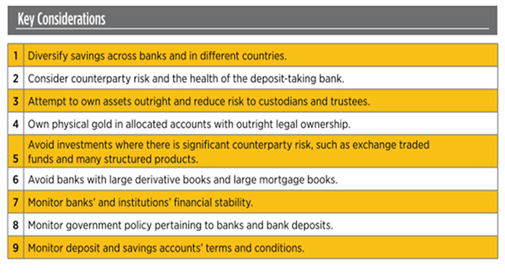Deposit bail-in risks are slowly being realised in Ireland, after it emerged overnight that FBD, one of Ireland's largest insurance companies, have been moving cash out of Irish bank deposits and into bonds. Revelations regarding deposit bail-in risks came in the wake of warnings of a new property crash centred on the housing market in Ireland. The former deputy governor of the Central Bank warned in an op-ed in a leading international financial publication, Project Syndicate, that Ireland is at risk of another housing market crash. Bail-In Regimes – Key Considerations (GoldCore Research) Insurer FBD has moved over €150 million out of the Irish banking system and into corporate and sovereign bonds over the past year. The move was prompted by low returns offered by bank deposits and the risks that deposit bail-in rules could see deposits confiscated. FBD chief executive Fiona Muldoon told the Irish Independent that the "extremely low returns offered on term deposits by banks, coupled with fears that new bail-in rules introduced this year by the European Union could expose bank bondholders and depositors to bailing out a failed lender, meant it has shifted investments away from banks." The new deposit bail-in mechanism is designed to protect banks and is touted as a way to prevent taxpayers being liable for bailing out collapsed lenders.
Topics:
GoldCore considers the following as important: Bank of England, creditors, European Union, Housing Market, Insurance Companies, Ireland, Marc Faber, Market Crash, recovery, Reuters, Unemployment, Zurich
This could be interesting, too:
Marc Chandler writes The Dollar Remains Bid, While the Euro and Swiss Franc are Sold Through Last Week’s Lows
Marc Chandler writes Searching for Direction
Marc Chandler writes Serenity Now
Marc Chandler writes FX Becalmed Ahead of the Weekend and Next Week’s Big Events
Deposit bail-in risks are slowly being realised in Ireland, after it emerged overnight that FBD, one of Ireland's largest insurance companies, have been moving cash out of Irish bank deposits and into bonds.
Revelations regarding deposit bail-in risks came in the wake of warnings of a new property crash centred on the housing market in Ireland. The former deputy governor of the Central Bank warned in an op-ed in a leading international financial publication, Project Syndicate, that Ireland is at risk of another housing market crash.
 Bail-In Regimes – Key Considerations (GoldCore Research)
Bail-In Regimes – Key Considerations (GoldCore Research)
Insurer FBD has moved over €150 million out of the Irish banking system and into corporate and sovereign bonds over the past year. The move was prompted by low returns offered by bank deposits and the risks that deposit bail-in rules could see deposits confiscated.
FBD chief executive Fiona Muldoon told the Irish Independent that the "extremely low returns offered on term deposits by banks, coupled with fears that new bail-in rules introduced this year by the European Union could expose bank bondholders and depositors to bailing out a failed lender, meant it has shifted investments away from banks."
The new deposit bail-in mechanism is designed to protect banks and is touted as a way to prevent taxpayers being liable for bailing out collapsed lenders. It is believed that it leaves bank bondholders and deposit customers with more than €100,000 on deposit at risk of footing the bill.
There is a belief that bail-ins only relate to “the wealthy” and "rich" depositors as they will be imposed on those with deposits greater than national deposit guarantees. These deposit “guarantees” are generally the ‘big round’, arbitrary number of say €100,000, $250,000 and £75,000. These are not particularly large amounts and could amount to the entire life savings of a pensioner, a family or indeed it could be the entire capital of a small to medium size business enterprise.
An example of this is the UK where the deposit guarantee was arbitrarily, suddenly and with little fanfare quietly reduced from £100,000 to £75,000 just last year in July 2015.
Thus, it is important to note that the arbitrary round number in the various government deposit guarantees can be, and probably will be, reduced to a lower number – say the new round number of €50,000, £50,000 and $50,000 - depending on the severity of the next banking crash.
In the event of bail-ins, governments and banks are likely to seek to impose deeper haircuts on creditors including depositors in order to bail-out and protect the failing banking system.
FBD's deposits with Irish banks were reduced from €451 million to €305 million in recent months. FBD made a €3.1m loss in the first half of the year.
As reported by the Irish Independent:
"As they mature, and as the bank bail-in rules come into play, it's no longer the case that for corporate investors depositing at a bank is risk free," she added.
"To be honest, the return is abysmal now. We've gone back to a more typical investment portfolio for an insurance company."
"You have to be paid for the risk you take," she added. "You might entertain the bail-in risk if you were being properly paid. But if you've a bank trying to charge you for leaving your money with them, you're not inclined to take any risk at all."
The recent bank stress tests showed that Irish banks are the most vulnerable in the EU in the event of another financial crisis.
Meanwhile, the risk of another property crash centred on the housing market has been warned of by a respected economist. Stefan Gerlach, who left the Central Bank of Ireland earlier this year to become Chief Economist at BSI Bank in Zurich, asked:
"Having endured the collapse of its housing market less than a decade ago, Ireland has lately been experiencing a blistering recovery in prices, which already have risen in Dublin by some 50% from the trough in 2010, is Ireland setting itself up for another devastating crash?”
Among the concerns he expresses in an article titled 'The Return of Ireland’s Housing Bubble' for the global finance think-tank Project Syndicate is that the Central Bank here is coming under undue pressure from the construction industry and politicians to relax the loan to value and loan to income ratios on mortgage lending it introduced last year.
He warns that while housing bubbles are easy to spot, there are a number of conflicts of interest that make it hard to take action as the market gets out of control as reported by Newstalk:
"The obvious question is why nobody stepped in before it was too late. The answer is simple: while the bubbles are inflating, many people benefit. With the construction sector thriving, unemployment falling, and banks lending freely, people are happy – and politicians like it that way."
"Many in Ireland might find that conclusion overly pessimistic. Maybe they are simply hoping that, this time, the luck of the Irish will hold. Perhaps it will, and this time really is different. But there isn’t much evidence of that," he concludes.
The 'Bail-in regime' is one of the greatest financial risks to investors, savers and indeed companies internationally today. Yet it remains the most poorly covered financial risk and is largely ignored by financial advisers, brokers and not surprisingly governments and banks.
The growing financial risk in all western countries has not been properly analysed. In a world already beset with huge deflationary pressures and still insolvent banks, the bail-in regime and confiscating deposits, especially from job creating companies, would be extremely deflationary and would likely contribute to severe recessions.
This is something we warned of when we first conducted our extensive research on the developing global bail-in regimes after the Cyprus bail-ins in 2013. Diversification of deposits remains vital and one important way to protect against a bail-in is owning physical gold. Taking delivery of gold coins and bars and owning bullion in allocated and segregated storage in the safest vaults in the world is a prudent way to protect against the deposit bail-in regime.
Gold and Silver Bullion - News and Commentary
Gold Rises as Fed Rate Hike Bets Recede, Dollar Near June Low (Bloomberg)
Gold steady as U.S. data lowers rate hike prospects (Reuters)
Latest gold, forex rates in UAE (Emirates247)
Bail-in deposit fears spur insurance company move to bonds (Independent)
Ireland warned of new property crash (Independent)
Goldman is squaring up against JPM and HSBC to decide the future of gold trading (Business Insider)
European Close Sparks $5 Billion Selling-Panic In Gold Futures (Zerohedge)
RBC adds $200 to its gold price forecast (Mining.com)
Silver Kangaroo Sales Head For New Records (Numismatic News)
Coming Global Silver Production Collapse & Skyrocketing Price (SRS Rocco Report)
Gold Prices (LBMA AM)
15Aug: USD 1,339.20, GBP 1,037.21 & EUR 1,198.85 per ounce
12Aug: USD 1,336.70, GBP 1,032.60 & EUR 1,199.02 per ounce
11Aug: USD 1,344.55, GBP 1,037.05 & EUR 1,206.06 per ounce
10Aug: USD 1,351.85, GBP 1,035.11 & EUR 1,209.23 per ounce
09Aug: USD 1,332.90, GBP 1,025.80 & EUR 1,201.74 per ounce
08Aug: USD 1,330.00, GBP 1,019.84 & EUR 1,198.86 per ounce
05Aug: USD 1,362.60, GBP 1,036.39 & EUR 1,222.53 per ounce
Silver Prices (LBMA)
15Aug: USD 19.90, GBP 15.40 & EUR 17.81 per ounce
12Aug: USD 19.87, GBP 15.33 & EUR 17.81 per ounce
11Aug: USD 20.21, GBP 15.56 & EUR 18.13 per ounce
10Aug: USD 20.34, GBP 15.55 & EUR 18.19 per ounce
09Aug: USD 19.70, GBP 15.18 & EUR 17.77 per ounce
08Aug: USD 19.66, GBP 15.04 & EUR 17.74 per ounce
05Aug: USD 20.22, GBP 15.36 & EUR 18.14 per ounce
Recent Market Updates
- Money "Madness" Negative Interest Rates Sees Gold Buying Surge
- Gold Investment Demand Reaches Record In First Half 2016 On “Perfect Storm”
- Peak Gold – Did Gold Production Peak in 2015?
- Financial Times: “Victory For Gold Bulls Is Only Just Beginning”
- Irish Banks Most Vulnerable In Stress Tests – Banking Contagion In EU Cometh
- Gold In Sterling 2.2% Higher After Bank Of England Cuts To 0.25% and Expands QE
- Silver Kangaroo Coins – Sales Surge To Over 10 Million
- Trump, Clinton, "Ugliest" Election Coming - Gold's "Summer Doldrums" Prior To Resumption of Bull Market
- Marc Faber: Invest 25% Of Investment Portfolios In Gold Bullion
- “Could Not Invent A More Bullish Story For Gold Bullion”
- Gold In Bull Market – “Every Reason For It To Continue” – Frisby In Money
- Is Gold Set To Hit $1,500 Per Ounce?
- Why Italy’s bank crisis could be a ‘ticking time bomb’


